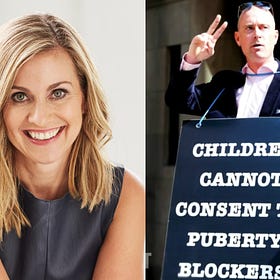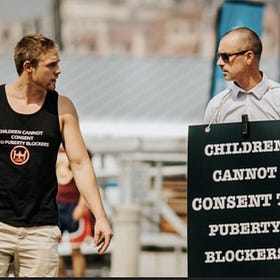Should the Australian eSafety Commissioner's powers be expanded?
A review of the eSafety legislation is open for public submissions until 5pm Friday 21 June
In 2015 Australia established the office of the eSafety Commissioner, the world’s first government regulator with a mandate to protect children from online harm.
Since 2015, eSafety has grown from 37 staff to 125, with an annual budget of AU $42.5 million and a remit encompassing a broad range of online harms, including child sexploitation, image based abuse, cyber bullying, adult cyber abuse, and violent and terrorist content.
The Australian Government is now seeking to expand the eSafety Commissioner’s powers further to combat new forms of online harm. This process begins with statutory review of the underpinning legislation, the Online Safety Act (2021), which is open for public submissions until 5pm Friday 21 June 2024.
From the public consultation landing page,
“The Review is a broad-ranging examination of the effectiveness of the Act, and will consider whether additional protections are needed for harmful online material such as online hate and image-based abuse.
“It will consider the need for further protections to address online harms stemming from new and emerging technologies like generative artificial intelligence (including deepfakes) and algorithms, and whether the existing penalty regime works as an effective deterrent to industry non-compliance.
“The Review will also consider international developments in online safety regulation, including whether the law should be amended to impose on platforms a new duty of care towards their users, and what further steps can be taken to ensure industry acts in the best interests of children on their services.”
A 70-page Issues Paper provides background and poses 33 questions to be discussed in the statutory review of the Online Safety Act (OSA) addressing a large swathe of developments. Some of the questions are posed in a way that would allow for the winding back of the OSA legislation, but the focus is overwhelmingly on strengthening eSafety’s existing schemes or adding new tools and scope to combat emerging threats.
Some of the ideas proposed in question form are:
Should the eSafety Commissioner have more powers to enforce industry standards on a broader range of platforms and content;
Should the eSafety Commissioner have stronger investigation, information gathering and enforcement powers?
Should the powers be flexible to allow for adaption with the emergence of new technologies;
Should penalties issued to naughty platforms be larger and should the eSafety Commissioner be able to impose business disruption sanctions(penalties in other jurisdictions are included for comparison);
Should we have more collaboration with other governments to create and enforce global regulatory standards;
Should eSafety data be accessible to researchers and eSafety staff;
Should platforms have to pay fees to eSafety to offset the cost of regulating them;
Should we have age-verification to protect kids from porn (which may tie in with the Australian Government’s newly legislated Digital ID framework);
How should eSafety tackle the problem posed by end-to-end encryption so far as it prevents detection of child abuse material?
The review questions also mention balancing innovation, privacy, security, and safety, and upholding human rights.
In the forward to the Issues Paper, Communications Minister Michelle Rowland emphasises the risks posed by generative AI and the amplification of hate speech on social media. These are the main points the government has touted in the press as justification for urgently reviewing the OSA legislation with a view to expansion, along with the need to ban deepfake pornography, pilot age-assurance technologies and combat misogyny online.
The Albanese Government deems these threats so urgent that it has brought the scheduled three-yearly statutory review of eSafety’s powers forward by 12 months. (The OSA (2021) was implemented in January 2022, so the next review was due in 2025.)
About eSafety
eSafety is led by the Commissioner, Julie Inman Grant, who has been at the helm of the Australian Government agency since 2017. Under the OSA, eSafety regulates online harm including child cyberbullying, adult cyber-abuse, non-consensual sharing of intimate images, illegal and restricted content, and material depicting abhorrent violent conduct. eSafety also has an educational role, providing resources and running programs geared towards harm prevention.
Most online harms are dealt with through a complaints-based system, where members of the public report content, which eSafety then investigates. Following investigation, eSafety may take actions such as sending formal or informal notices to platforms requesting content removal, or referring content to the Australian Federal Police.
Additionally, eSafety has two schemes that take a systems-level approach to preventing online harm: industry codes and standards created under the Online Content Scheme, and Basic Online Safety Expectations (BOSE). eSafety has range of remedial options available to force platforms to toe its line, including fines of up to AU $782,500 per day.
The BOSE are not legally enforceable, but eSafety has the power to issue transparency notices requiring platforms to report on how they are (or are not) adhering to the BOSE. eSafety initiated civil penalty proceedings against social media platform X in December last year for failing to comply with one such transparency notice. The Issues Paper raises the possibility of strengthening the BOSE and making them enforceable.

To the best of my knowledge, the office of the eSafety Commissioner plays an important role in helping Australians deal with child sexploitation and abuse material, image based abuse, and child cyber bullying, filling legal, technological and personnel gaps not covered by the police.
Criticisms: bias and overreach
Where the eSafety Commissioner has copped criticism it has been for censoring valid expression, particularly on gender issues, and for attempting to stretch her powers to unreasonable lengths.
The Commissioner’s powers are discretionary (OSA, Section 88), which leaves the potential for bias in their application. That bias tends to swing in favour of gender ideology, with a growing number of gender-critical posts on social media being censored due to removal notices issued by the eSafety Commissioner, including a post suggesting that men can’t breastfeed.
Other high-profile cases of gender-critical censorship include a post by Canadian activist Billboard Chris criticising a trans-identifed person’s appointment to a World Health Organisation’s (WHO) advisory panel on trans health policy, and a post by Australian Celine Baumgarten criticising a primary school queer club and identifying the Australian teacher who runs it (publicly available information).
Billboard Chris’s (real name Chris Elston) use of the subject’s natal pronoun (she) rather than the preferred pronoun (he) is an example of “gendered hate” according to eSafety’s gendered violence guidelines. Both Elston and Baumgarten having initiated appeal proceedings with the assistance of the Free Speech Union of Australia (FSU).
A recent tussle between eSafety and X over violent footage of a non-fatal church stabbing, deemed a terror incident, displayed another sort of overreach - in this case, geographical. eSafety obtained a temporary injunction in an effort to force X to remove the footage globally, arguing that geo-blocking the footage did not go far enough to prevent Australians with VPNs from viewing the content.
However, a judge refused to extend the injunction, determining that eSafety’s attempt to censor content outside its jurisdiction was ‘not reasonable.’ Shortly after, eSafety dropped the case against X.
Again, Inman Grant faced criticism in the media and online for trying to censor the global internet, though she “stand[s] by my investigators and the decisions eSafety made," laying the blame for the backlash on X’s billionaire owner Elon Musk.
"He issued a dog-whistle to 181 million users around the globe, which resulted in death threats directed at me, which resulted in doxxing of my family members, including my three children,” she said.
Death threats and doxxing are abhorrent and should not be directed towards anyone. At the same time, it should be noted that while Musk publicly criticised Inman Grant and her agency, as she does regularly of him and X, he did not call for or condone harassment, doxxing or violence towards her. It should also be noted that Inman Grant has not publicly acknowledged her role in drawing a high volume of criticism towards herself personally, and towards her office.
Inman Grant’s repeated jabs at Musk have been a point of contention since he took ownership of the social media platform, formerly Twitter, in 2022. Inman Grant worked at Twitter before Musk’s ownership, and she has expressed strong disapproval for his cuts to the platform’s trust and safety teams in particular.
Additionally, Inman Grant’s World Economic Forum-aligned globalist sensibilities (including her infamous assertion that free speech online is a right that needs to be “recalibrated”) have raised eyebrows across the internet since she started appearing regularly on the WEF circuit several years ago.
Bipartisan support for expanding eSafety’s powers despite public opposition
In opposition to the perceived overreach and biases of the eSafety Commissioner and her office, FSU is assisting with legal appeals as mentioned above, and has launched a petition to abolish eSafety altogether. FSU has also created an online tool for Australians to make a submission to the government’s statutory review of the OSA (2021), stating, “it is important not to allow the eSafety Commissioner to claim even more powers to censor the internet.”
As it stands, the eSafety Commissioner has the full backing of the Albanese Government and the opposition. Both have called for tightening the screws on social media platforms to address division and hate online and have backed Inman Grant to the hilt, with opposition leader Peter Dutton recently calling Inman Grant "one of the finest public servants in the employment of the Commonwealth of Australia."
As the past two statutory reviews of online safety legislation have resulted in the expansion of eSafety’s powers, and as both the government and the opposition have voiced support for further expansion, it is most likely that this will be the outcome of the review, regardless of public and stakeholder opinion.
However, strong public feedback in the consultations phase can affect public opinion, as was seen in the media coverage of the government’s proposed misinformation bill after it received a high volume of strongly negative submissions. The negative media coverage forced the government to overhaul the bill, for which the government is now furiously trying to manufacture consent before it is re-tabled later this year.
The Australian Government’s Statutory Review of the Online Safety Act 2021 is open for public submissions until 5pm Friday 21 June 2024.
Communications Minister Michelle Rowland will provide a report on the statutory review by 31 October 2024.
To support my work, share, subscribe, and/or make a one-off contribution to DDU via my Kofi account. Thanks!
eSafety back catalogue »
Big Mother is listening: Australia's eSafety monitors what you say about Julie Inman Grant online
Australia’s online harms regulator eSafety receives daily reports from private ‘social listening’ firm Meltwater to monitor community sentiment about its Commissioner, Julie Inman Grant, newly released documents show. 26 Meltwater reports released to me under Freedom of Information…
Judge says eSafety's global content ban order 'not reasonable'
Yesterday, I reported that the Australian Federal Court had denied the eSafety Commissioner’s request to extend an injunction forcing X to enact a global ban on footage of the Wakeley stabbing. This morning, Justice Kennett’s decision has been published in full
Elon Musk wins latest censorship battle against Australia's eSafety
Can Australia’s eSafety Commissioner block content globally on demand? Not today, ruled the Australian Federal Court, in a win for Elon Musk’s social media platform X. In a decision this morning, Justice Geoffrey Kennett refused to extend a temporary injunction
Australian government hijacks knife attacks to push for misinformation laws
Like Emily Blunt’s character in The Devil Wears Prada, who was ‘just one stomach flu away from goal weight,’ the Australian government was just one emergency away from manufacturing consent for its widely panned misinformation bill… until now.
'Highly disturbing': Australian government censorship gone too far
On Australian prime time TV this week, panelists on current affairs show The Project questioned the wisdom of government agencies singling out social media posts for removal, particularly on subjective topics like gender ideology. The segment marks what may be viewed as a cultural tipping point in years to come.
'Spectacular backfire': Australian government's attempt to censor trans post draws heat
First it took down tweets on breastfeeding. Now, Australia’s online safety regulator, the eSafety Commissioner, has threatened social media platform X (formerly Twitter) with a hefty fine over a post characterising the trans male identification of a bearded natal female as a psychiatric condition.
Australia's eSafety Commissioner initiates civil penalty proceedings against social media platform X
Days after the European Union (EU) initiated formal infringement proceedings against social media company X, Australia has followed suit. In a statement on Thursday 21 December, Australia’s regulator for online safety, eSafety, announced it has commenced civil penalty proceedings against X in the Federal Court over its alleged failure to comply with a ‘…
The Australian Government agency policing tweets on breastfeeding
Earlier this week I reported on a series of document releases revealing that the Australian Government had colluded with Big Tech platforms to censor online speech related to Covid. Several days later, the Australian edition of the Twitter Files dropped, and we gained insight into the stunning micromanagement of the speech of everyday Australians that t…












Having witnessed the greatest overreach in government/ bureaucratic/ technocratic control during the Covid years, and speaking as a philosophical conservative in line with Roger Scruton's definition, any attempt to increase power of the public sector over private individuals without VERY strict parameters can only end in tyranny. Those parameters should obviously protect children. Ironic that the same bodies are pushing transgender ideology and gender reassignment practices in children whilst criminalizing dissent. Dutton is doing himself no favours, though is clearly trying to play both sides at once. He is, after all, a politician.
Ordinary Australia have enough controls without more nonsense being imposed on us for any flimsy reasons If needed let it be done to include proper aspects for all people & not have that present female who rends to lord it over supposedly ignored nobodies